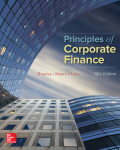
EBK PRINCIPLES OF CORPORATE FINANCE
12th Edition
ISBN: 9781259358487
Author: BREALEY
Publisher: MCGRAW HILL BOOK COMPANY
expand_more
expand_more
format_list_bulleted
Textbook Question
Chapter 13, Problem 19PS
Behavioral finance True or false?
- a. Most managers tend to be overconfident.
- b. Psychologists have found that, once people have suffered a loss, they are more relaxed about the possibility of incurring further losses.
- c. Psychologists have observed that people tend to put too much weight on recent events when
forecasting . - d. Behavioral biases open up the opportunity for easy arbitrage profits.
Expert Solution & Answer
Want to see the full answer?
Check out a sample textbook solution
Students have asked these similar questions
The term 'liquidity' in business refers to:A. The ability to generate profitB. The ease with which an asset can be converted into cashC. The long-term financial stability of a companyD. The amount of debt a company carries
need help
No chatgpt!
Which type of bond offers tax advantages? A) Convertible bonds B) Municipal bonds C) Corporate bonds D) Junk bonds
I need correct answer!
Which type of bond offers tax advantages? A) Convertible bonds B) Municipal bonds C) Corporate bonds D) Junk bonds
Chapter 13 Solutions
EBK PRINCIPLES OF CORPORATE FINANCE
Ch. 13 - Market efficiency True or false? The...Ch. 13 - Prob. 2PSCh. 13 - Market efficiency Which (if any) of these...Ch. 13 - Prob. 4PSCh. 13 - Market efficiency How would you respond to the...Ch. 13 - Market efficiency Respond to the following...Ch. 13 - Prob. 7PSCh. 13 - Prob. 8PSCh. 13 - Market efficiency evidence Which of the following...Ch. 13 - Prob. 10PS
Ch. 13 - Prob. 11PSCh. 13 - Prob. 12PSCh. 13 - Market efficiency implications What does the...Ch. 13 - Prob. 14PSCh. 13 - Prob. 15PSCh. 13 - Abnormal returns Here are alphas and betas for...Ch. 13 - Prob. 18PSCh. 13 - Behavioral finance True or false? a. Most managers...Ch. 13 - Prob. 20PSCh. 13 - Prob. 21PSCh. 13 - Prob. 22PS
Knowledge Booster
Learn more about
Need a deep-dive on the concept behind this application? Look no further. Learn more about this topic, finance and related others by exploring similar questions and additional content below.Similar questions
- What is the main purpose of budgeting in a company? A) To eliminate all expensesB) To forecast and control costsC) To increase revenueD) To reduce taxes i need correct answer!!arrow_forward2. A 'competitive advantage' means:A. A company has lower prices than its competitorsB. A company has a unique product or service that gives it an edgeC. A company offers the same product as its competitorsD. A company has the largest market sharearrow_forwardWhich type of bond offers tax advantages? A) Convertible bondsB) Municipal bondsC) Corporate bondsD) Junk bondsneed help!arrow_forward
- Which type of bond offers tax advantages? A) Convertible bondsB) Municipal bondsC) Corporate bondsD) Junk bondsarrow_forwardWhat does "liquidity" refer to in finance? A) The profitability of a companyB) The ease of converting assets to cashC) The value of fixed assetsD) The number of outstanding shares i need answer.arrow_forwardNo chatgpt! What does "liquidity" refer to in finance? A) The profitability of a companyB) The ease of converting assets to cashC) The value of fixed assetsD) The number of outstanding sharesarrow_forward
- What is the main purpose of budgeting in a company? A) To eliminate all expensesB) To forecast and control costsC) To increase revenueD) To reduce taxesarrow_forwardWhat does "liquidity" refer to in finance? A) The profitability of a companyB) The ease of converting assets to cashC) The value of fixed assetsD) The number of outstanding sharesarrow_forwardI need answer in this problem quickly. The Weighted Average Cost of Capital (WACC) includes: A) Cost of equity and cost of debtB) Only the cost of equityC) Only the cost of debtD) Total revenue of the companyarrow_forward
- Help me in this question. The Weighted Average Cost of Capital (WACC) includes: A) Cost of equity and cost of debtB) Only the cost of equityC) Only the cost of debtD) Total revenue of the companyarrow_forwardNeed answer! The Weighted Average Cost of Capital (WACC) includes: A) Cost of equity and cost of debtB) Only the cost of equityC) Only the cost of debt D) Total revenue of the companyarrow_forwardThe Weighted Average Cost of Capital (WACC) includes: A) Cost of equity and cost of debtB) Only the cost of equityC) Only the cost of debtD) Total revenue of the companyarrow_forward
arrow_back_ios
SEE MORE QUESTIONS
arrow_forward_ios
Recommended textbooks for you
 Financial Reporting, Financial Statement Analysis...FinanceISBN:9781285190907Author:James M. Wahlen, Stephen P. Baginski, Mark BradshawPublisher:Cengage Learning
Financial Reporting, Financial Statement Analysis...FinanceISBN:9781285190907Author:James M. Wahlen, Stephen P. Baginski, Mark BradshawPublisher:Cengage Learning

Financial Reporting, Financial Statement Analysis...
Finance
ISBN:9781285190907
Author:James M. Wahlen, Stephen P. Baginski, Mark Bradshaw
Publisher:Cengage Learning
Framing Effect: Facts vs Half-Truths & Manipulation; Author: UKspreadbetting;https://www.youtube.com/watch?v=aMNOp9qMA2I;License: Standard youtube license